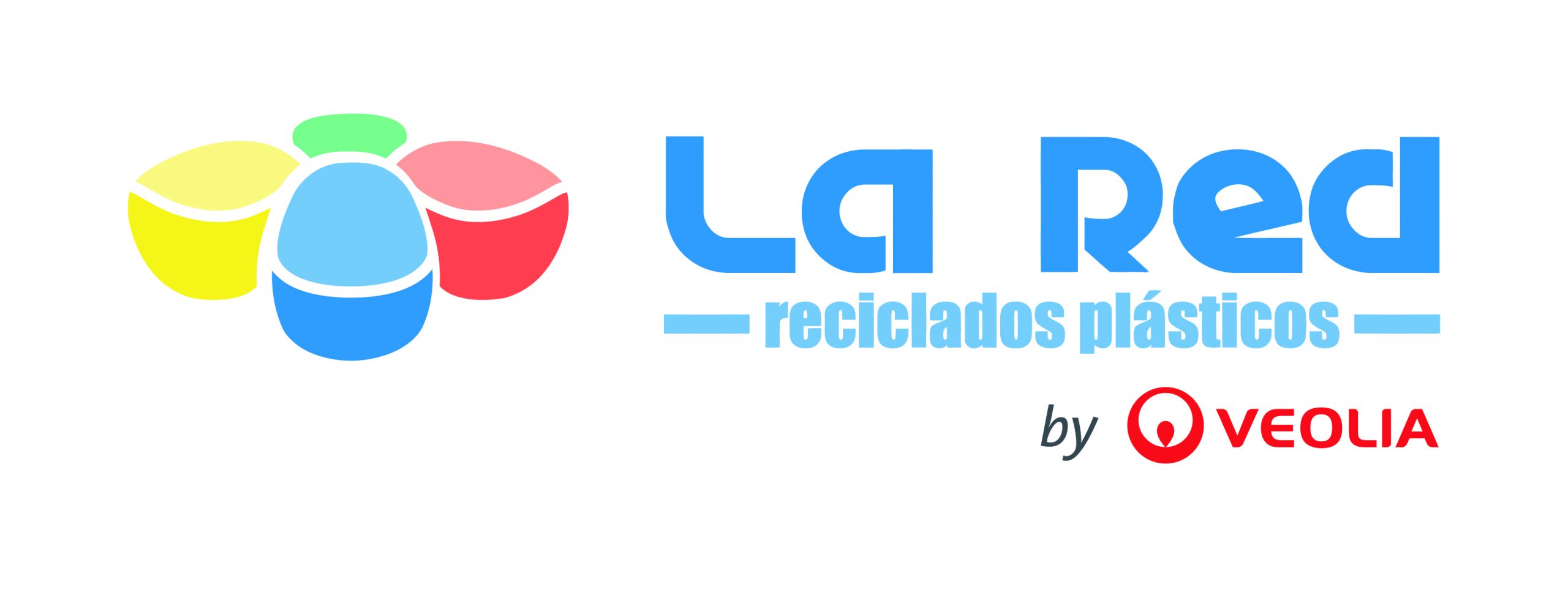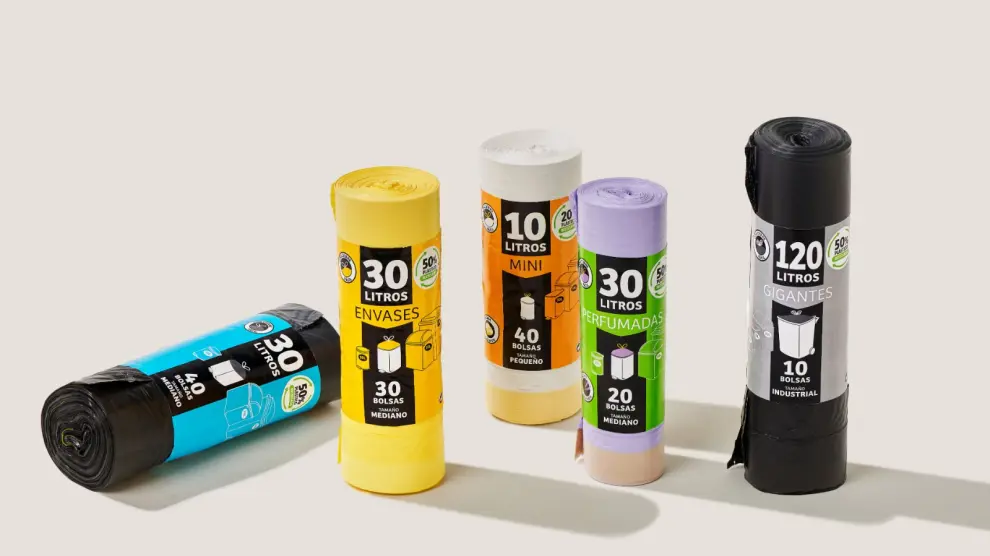
by webmasterMT | Oct 15, 2025 | Innovation, recycled material, Recycling, Sustainability
Purio Project
The circular economy stops being a theory and becomes a tangible reality with Lidl Spain’s Purio project. On October 9, 2025, Lidl Spain presented an innovative circular economy project: transforming the transparent plastic film from its pallets into six types of Purio trash bags. These bags, with capacities ranging from 10 to 100 liters and containing between 20% and 50% recycled material, are already available in more than 700 stores. The result is useful products for consumers that originate from internal waste and are certified by AENOR for circular economy, guaranteeing traceability and authenticity of the recycled content.
The project is built on a well-defined and entirely national value chain. Lidl separates and compacts the film in its stores and logistics platforms, ensuring the material arrives clean and homogeneous. At Reciclados La Red by Veolia, we receive this material and subject it to washing, sorting, and pelletizing, transforming it into high-quality recycled granules. Sphere España, from its plant in Pedrola (Zaragoza), uses these granules to manufacture Purio bags through extrusion and blowing processes, before distributing them to Lidl stores again.
This project is the first in Spain to obtain AENOR’s circular economy certification for a private label product. The certification guarantees traceability from the waste to the final product and verifies the recycled content.
Impact and key figures
- More than 1,500 tons of recycled plastic.
- Forecast of 16 million bags sold by the end of 2026.
- Six varieties with capacities ranging from 10 to 100 liters.
- Recycled content between 20% and 50%.
Operational process
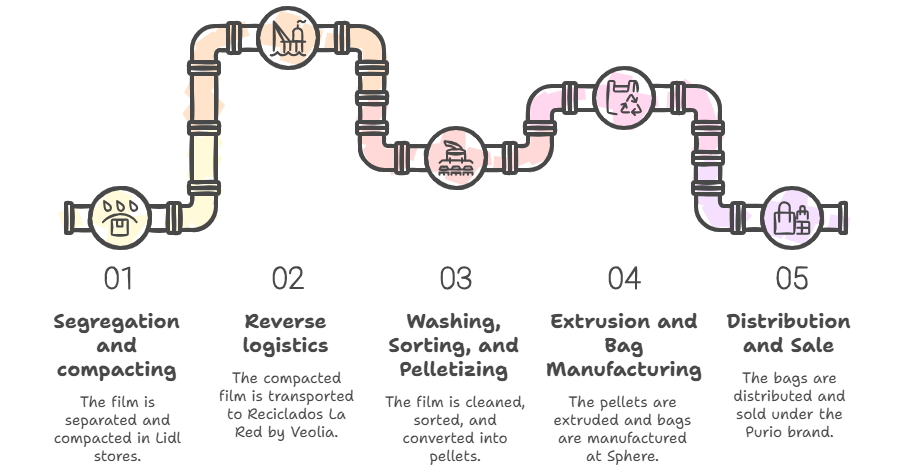
This “own waste” model closes the loop within the country and facilitates complete traceability of the flow, from the origin of the waste to the final product on the shelf. Additionally, it demonstrates that collaboration between companies with complementary roles can generate sustainable and scalable solutions. Lidl provides the waste and reverse logistics, Reciclados La Red by Veolia guarantees industrial transformation with quality and traceability, and Sphere España turns the recycled raw material into a final product that meets the necessary mechanical and durability requirements.
Although the recycled content is not total due to technical requirements, the project represents a significant step forward in reducing the use of virgin plastic and in adding value to internal waste. It is a clear example of how the circular economy can be integrated into the daily operations of large companies, generating environmental benefits and offering consumers responsible products.
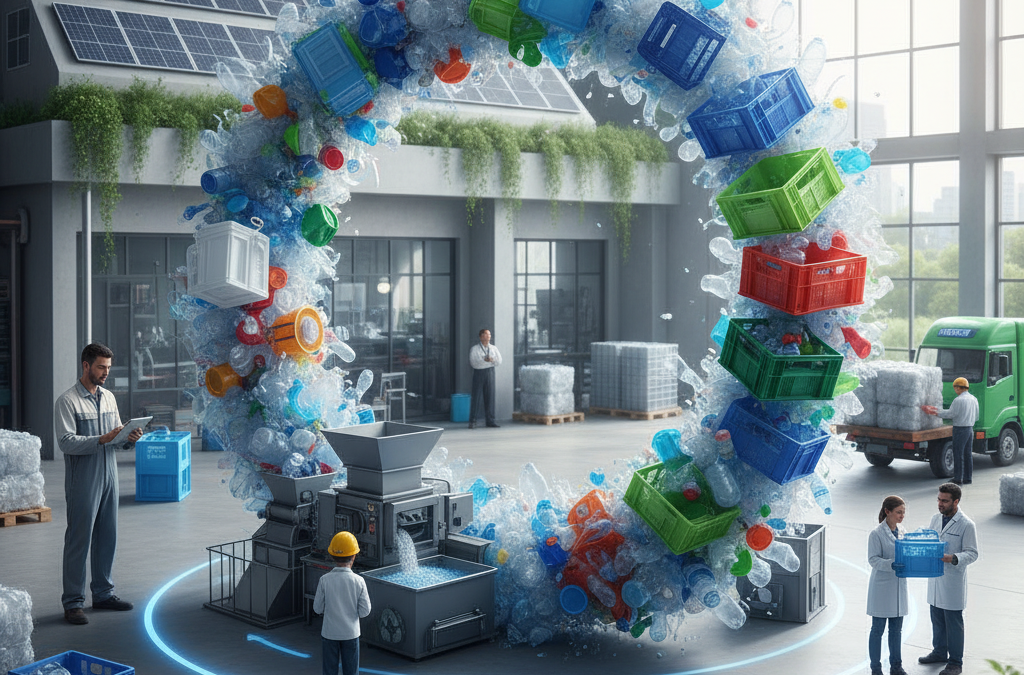
by webmasterMT | Oct 8, 2025 | Innovation, Recycling, Sustainability
The circular economy is much more than a trend: it is an urgent necessity to ensure a sustainable future. In Spain, recycled plastic has become a key pillar to closing the material life cycle, reducing environmental impact, and generating new economic opportunities.
At Reciclados La Red by Veolia, we work every day to transform plastic waste into high-quality raw material, ready to be used in responsible manufacturing processes.
The role of recycled plastic in the circular economy
Recycled plastic is key to closing the production cycle. By reincorporating this material into manufacturing:
- Fossil resource extraction is reduced.
- The carbon footprint decreases.
- Tons of plastic are prevented from ending up in landfills or oceans.
Environmental benefits
- Lower energy consumption compared to virgin plastic production.
- Reduction of CO₂ emissions.
- Conservation of ecosystems.
Economic benefits
- Savings in production costs.
- Creation of green jobs.
- Boost to innovation in materials.
The situation of recycled plastic in Spain
Spain has made notable progress in plastic recycling, but there is still a way to go. According to data from PlasticsEurope, the country recycles more than 40% of its plastic waste, and the trend is growing.
At Reciclados La Red by Veolia, we contribute to this progress with advanced technology and certified processes that guarantee the quality of recycled plastic.
Success stories and applications of recycled plastic
Recycled plastic is used in:
- Packaging and containers.
- Automotive components.
- Urban furniture.
- Construction products.
Practical example
An urban furniture company that uses recycled polyethylene reduces its carbon footprint and improves its brand image.
How your company can benefit
If your business uses plastic, incorporating recycled material can:
- Comply with environmental regulations.
- Improve corporate reputation.
- Reduce costs.
On our recycled products page you will find options tailored to your needs.
Challenges and opportunities
Although plastic recycling presents challenges such as selective collection and material quality, the opportunities are enormous:
- Process innovation.
- New markets.
- Strategic collaborations.
Contribute to the circular economy
Every action counts. From properly separating waste to choosing responsible suppliers, we can all drive the circular economy.
Recycled plastic is a powerful tool to advance towards a circular economy in Spain. At Reciclados La Red by Veolia, we are committed to sustainability and innovation.
Do you want to incorporate recycled plastic into your processes? Contact us today and take the next step towards a more sustainable future.
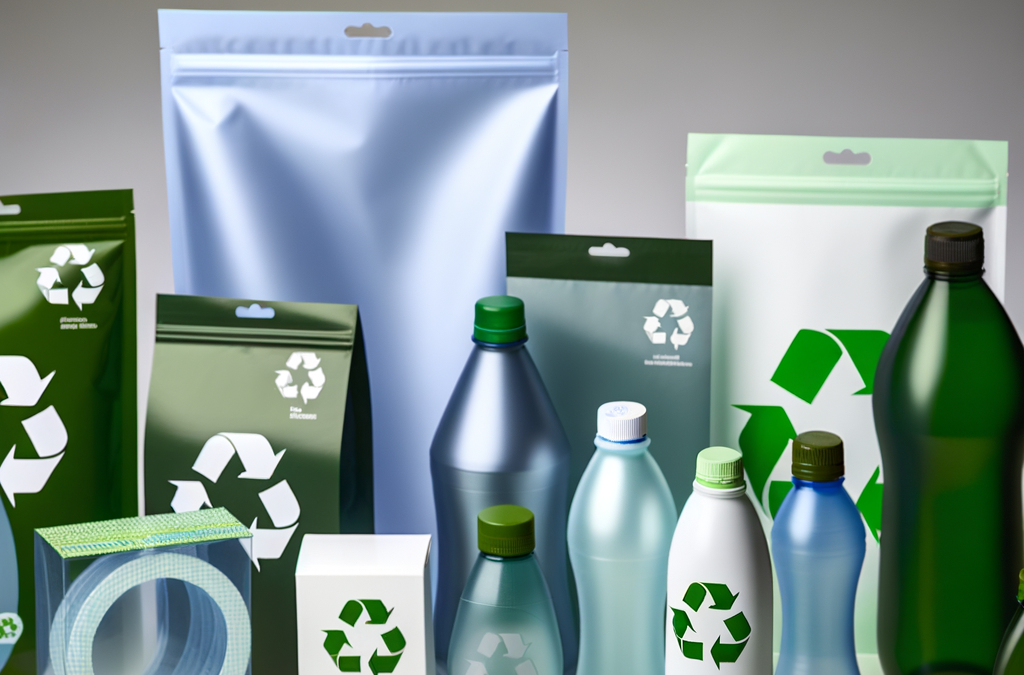
by webmasterMT | Sep 9, 2025 | Innovation, Legislation, Recycling, Sustainability
The future of plastic recycling in Spain after EU Regulation 2025/40
The plastic recycling sector is undergoing a true revolution. The new Regulation (EU) 2025/40 on packaging and packaging waste, approved by the European Union, marks a turning point for companies like Reciclados La Red by Veolia. This regulation replaces the 1994 Directive and establishes a stricter and more harmonized legal framework, forcing Spain to adapt its national legislation.
What is EU Regulation 2025/40 on packaging and waste?
Regulation EU 2025/40 is a direct response to the need to reduce packaging waste and promote the circular economy. Its goal is clear: minimize the environmental impact of packaging, increase reuse and recycling, and ensure that all EU countries follow the same rules.
Main new features of the Regulation
- Strict limits on the use of single-use packaging.
- More ambitious recycling targets.
- Requirements for minimum recycled content in packaging.
- Rules to improve recyclability and reuse of packaging.
- Greater transparency and traceability in the recycling chain.
Sustainability and circular economy goals
The Regulation drives the transition towards a circular economy, where waste becomes resources. For companies like Reciclados La Red by Veolia, this means new opportunities and responsibilities.
How does Regulation EU 2025/40 affect plastic recycling companies?
Challenges for recycling companies
Adapting to the new quality standards is one of the main challenges. The Regulation requires recycled plastic to meet stricter technical and safety requirements. In addition, controls and documentation are increased to guarantee the traceability of recycled material.
Companies will need to invest in technology and training to comply with these standards. It will also be necessary to improve separation and sorting processes to ensure the purity of recycled plastic.
Benefits and opportunities for the sector
The Regulation creates a larger and more uniform market for recycled plastic. By requiring packaging to contain a minimum percentage of recycled material, it increases demand for this product. This represents a unique opportunity for companies like Reciclados La Red by Veolia.
Moreover, the harmonization of standards facilitates the export of recycled plastic to other EU countries, removing legal barriers and opening up new business possibilities.
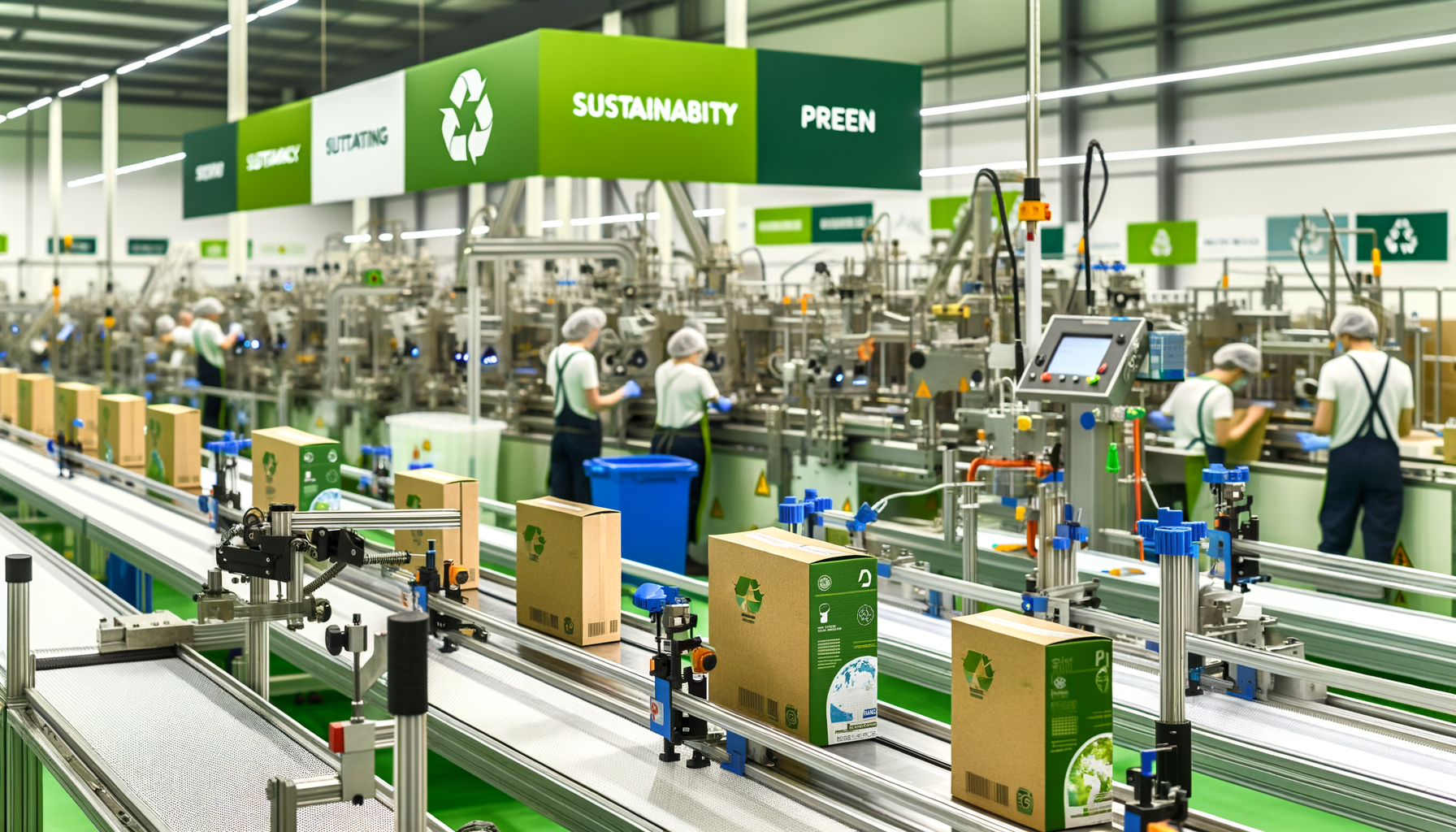
Key Challenges for Reciclados La Red by Veolia
Adapting to New Quality Standards
The quality of recycled plastic will be a key factor for competing in the new European market. Reciclados La Red by Veolia is investing in cutting-edge technology to ensure its product meets the most demanding requirements.
Traceability and Transparency in the Recycling Process
The Regulation requires full traceability of recycled material. This involves recording and documenting every stage of the process, from collection to the sale of the final product. Transparency will be fundamental to gain customers’ trust and comply with regulations.
Benefits of the New Regulation for Reciclados La Red by Veolia
Increase in Demand for Recycled Plastic
The obligation to include a minimum percentage of recycled plastic in packaging multiplies business opportunities. Reciclados La Red by Veolia is prepared to meet this growing demand by offering high-quality and sustainable products.
Expansion into the European Market
The harmonization of standards facilitates entry into new markets within the EU. This allows Reciclados La Red by Veolia to expand its customer network and consolidate its position as a benchmark in the sector.
How to Prepare for the Future of Plastic Recycling
Innovation and Collaboration in the Value Chain
Innovation will be key to adapting to new challenges. Reciclados La Red by Veolia is committed to collaborating with clients, suppliers, and other companies in the sector to develop innovative and sustainable solutions.
Training and Awareness
Continuous training of the team and raising awareness among clients are essential to comply with regulations and take advantage of the opportunities offered by EU Regulation 2025/40.
Conclusion and Call to Action
The new EU Regulation 2025/40 represents a challenge, but also a great opportunity for plastic recycling companies. At Reciclados La Red by Veolia, we are committed to sustainability and prepared to lead the transition towards a circular economy. Would you like to know how we can help you comply with the new regulations? Contact us and discover our recycled plastic solutions!
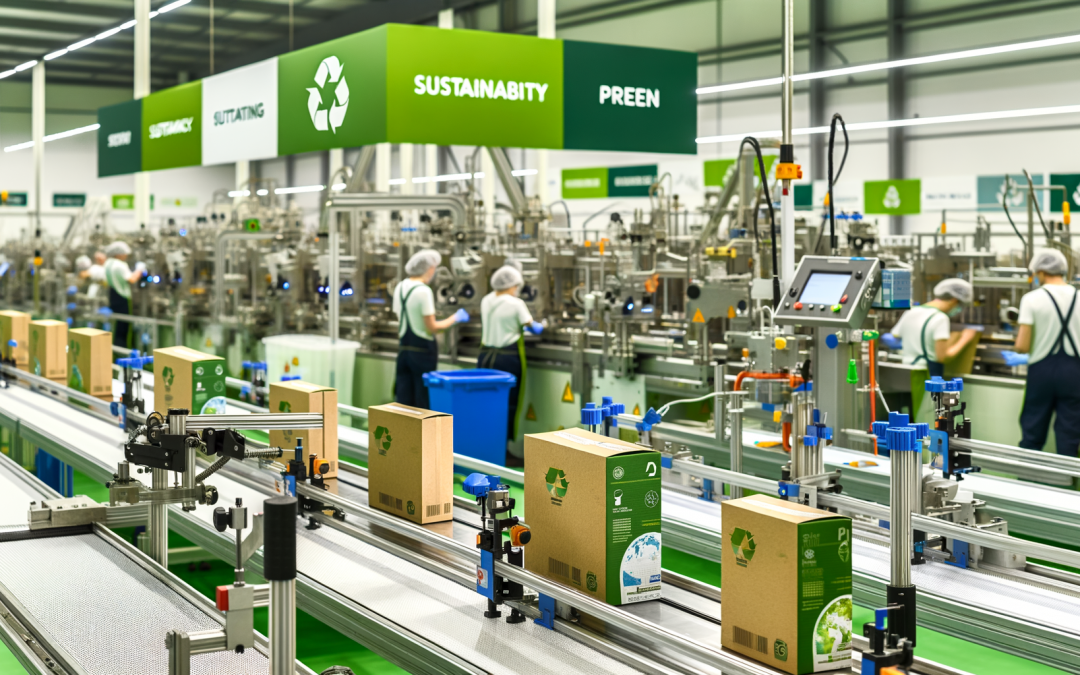
by webmasterMT | Aug 12, 2025 | Innovation, recycled material, Sustainability
How recycled plastic drives the transformation of key sectors
Did you know that more and more industries in Spain and Europe are integrating recycled plastic into their production processes? Social pressure, regulations, and the need to reduce costs have turned recycled plastic into a strategic resource for sectors such as automotive, packaging, construction, and agriculture.
Why are industries betting on recycled plastic?
Economic and environmental benefits
The use of recycled plastic allows companies to reduce the consumption of virgin raw materials, decrease their carbon footprint, and optimize costs. In addition, it contributes to the circular economy, preventing tons of plastic waste from ending up in landfills or the environment.
Regulatory compliance and access to new markets
European legislation requires minimum quotas of recycled material in products such as packaging and automotive components. Complying with these regulations not only avoids penalties but also opens the door to international markets and clients who value sustainability.
Main sectors that use recycled plastic
Automotive: efficiency and emissions reduction
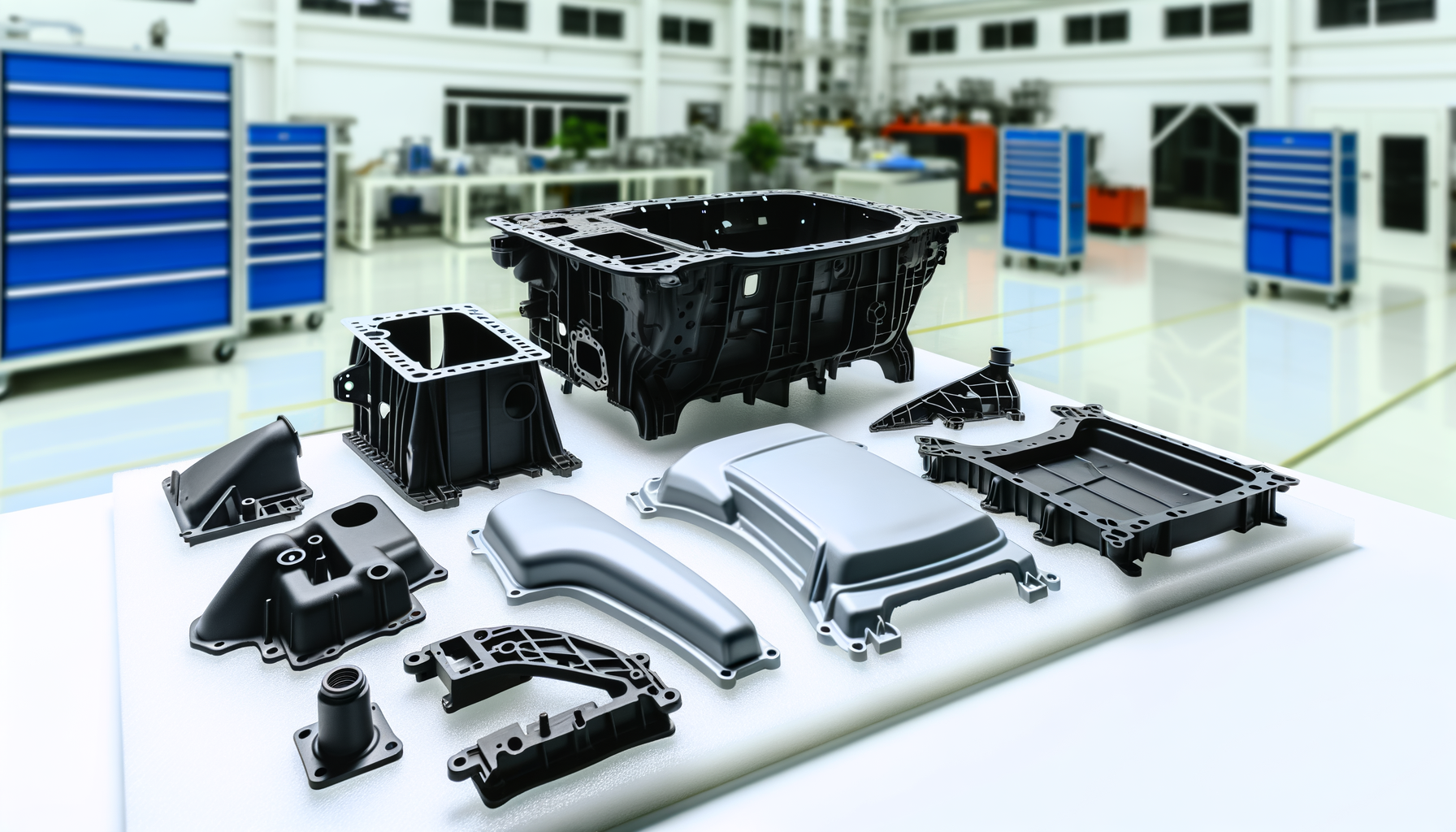
The automotive industry has been a pioneer in the integration of recycled plastics. They are used in bumpers, interior panels, and insulation systems. The goal is to reduce vehicle weight, lower CO₂ emissions, and comply with increasingly strict environmental regulations. Recycled polypropylene and polyethylene offer strength and durability, maintaining the quality required by the sector.
Advantages:
- Reduction in raw material costs
- Compliance with recycled content quotas
- Improved image with consumers and regulators
Challenges:
- Material approval
- Guarantee of stable and traceable supply
Packaging: response to sustainable demand
The packaging sector is one of the most active in adopting recycled plastic. Bottles, trays, films, and caps are increasingly incorporating recycled material to meet the demand for sustainable packaging and legislation that limits single-use plastics.
Advantages:
- Access to markets that require sustainable packaging
- Reduction of fees and taxes associated with virgin plastics
- Loyalty from environmentally conscious customers
Challenges:
- Compliance with food contact regulations
- Control of color and transparency
Construction and urban furniture: durability and circularity
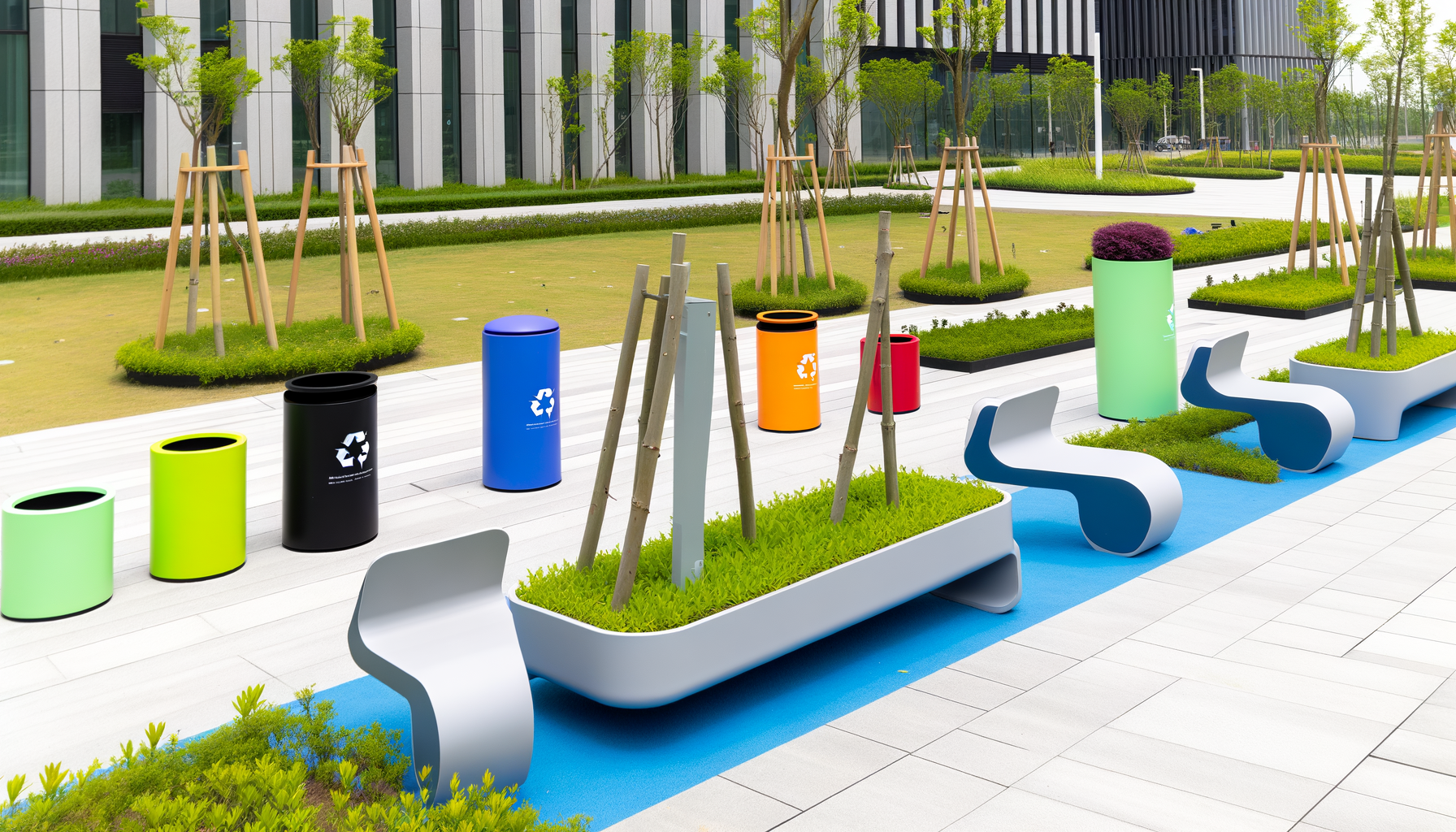
In construction, recycled plastic is used in pipes, panels, flooring, and urban furniture. Its weather resistance and low maintenance make it an attractive alternative to traditional materials.
Advantages:
Long service life and resistance
Contribution to sustainable building certifications
Reduction of waste on site
Challenges:
Adaptation to local regulations
Educating the end customer about the benefits
Agriculture: resistant and sustainable solutions
The agricultural sector uses recycled plastic in irrigation systems, greenhouse films, and packaging for agricultural products. These materials offer resistance, flexibility, and a second useful life for the plastic waste generated within the sector itself.
Challenges and solutions in the adoption of recycled plastic
Quality and safety of recycled material
One of the main challenges is ensuring that recycled plastic meets technical and regulatory standards. Thanks to advances in recycling technologies, it is now possible to obtain recycled materials with properties very similar to virgin ones, even certified for demanding applications such as food contact.
Adaptation of production processes
Integrating recycled plastic may require adjustments in machinery or manufacturing parameters. However, many companies have shown that, after a testing phase, it is possible to incorporate up to 30% recycled plastic without affecting the final quality of the product.
Consumer perception and effective communication
Some consumers still associate recycled plastic with lower quality. Brands that transparently communicate the use of recycled materials tend to gain customer trust and preference, especially in sectors such as packaging and urban furniture.
Success stories and tangible results
Automotive companies have managed to reduce costs and emissions by incorporating recycled plastic into their components. In the packaging sector, leading brands have built customer loyalty thanks to sustainable packaging. In construction, the use of recycled materials has facilitated the achievement of sustainable building certifications and the reduction of waste on site.
The future of recycled plastic in industry
The transition to recycled plastic is a real opportunity to innovate, reduce costs, and strengthen business reputation. Public incentives and European regulations are accelerating this transformation. Companies that stay ahead of regulations and commit to sustainability are gaining ground in increasingly demanding markets.
How can Reciclados La Red by Veolia help you?
At Reciclados La Red by Veolia, we offer recycled plastic solutions tailored to the needs of each sector. Our team supports companies throughout the process, from material selection to the adaptation of production processes and communication of sustainability achievements.
Visit our website to see our catalog of recycled pellets.
Do you want to lead the change towards more sustainable production? Contact Reciclados La Red by Veolia and discover how recycled plastic can transform your company.
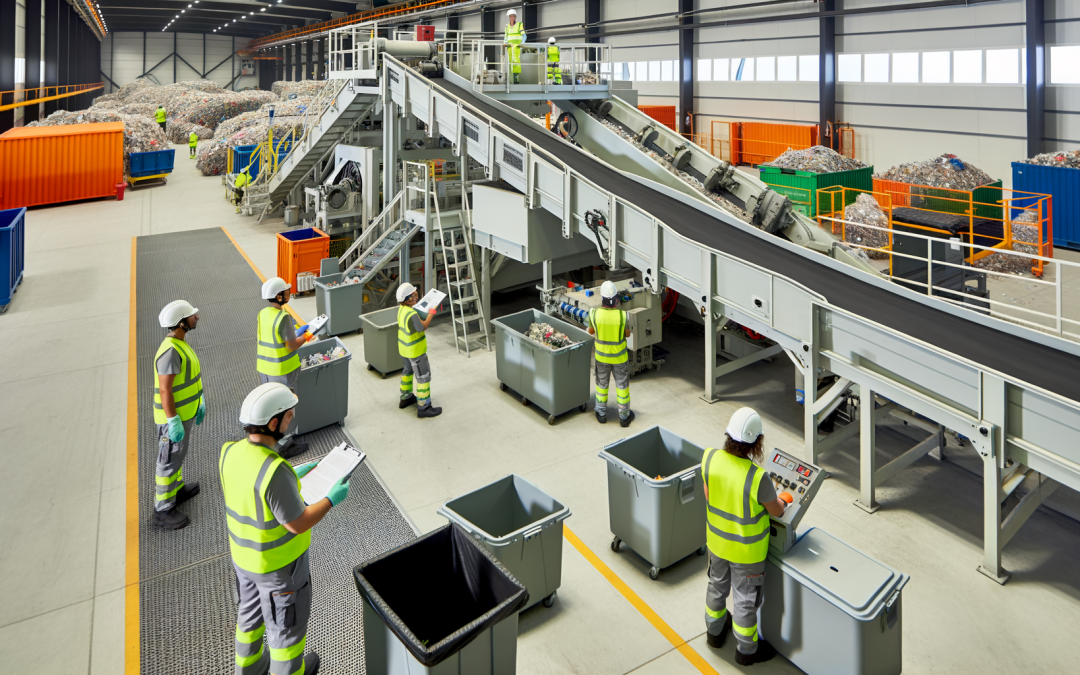
by webmasterMT | Jul 16, 2025 | Circular Economy, Innovation, recycled material, Recycling, Sustainability
Discover how plastic recycling drives the circular economy and protects the environment
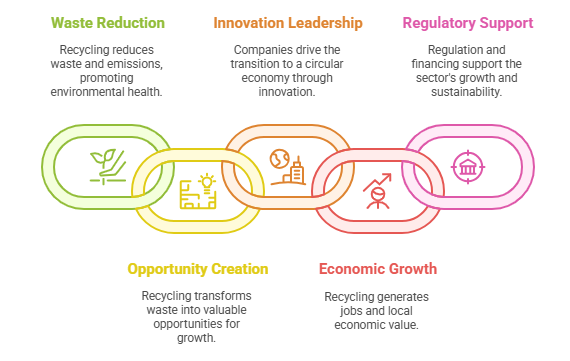
The challenge of turning waste into resources: current challenges
In recent years, the perception of plastic has changed radically. Many see it as the great environmental villain, but the reality is more complex. The real problem is not the material itself, but how we manage it after use. The accumulation of plastic waste in landfills and oceans, microplastic pollution, and dependence on fossil resources are just some of the consequences of a linear system of production and consumption.
Inadequate management of plastic waste generates profound environmental and social impacts. For example, the lack of selective collection infrastructure in many regions makes effective recycling difficult. This causes tons of plastics to end up in landfills or, worse, in natural environments, affecting biodiversity and human health.
Moreover, misinformation about recycling contributes to low citizen participation. Many people don’t know which types of plastics can be recycled or how they should be disposed of. This confusion reduces the quality of the recovered material and increases industrial processing costs.
On the other hand, the industry faces the challenge of ensuring the traceability and quality of recycled plastic. Customers demand safe, certified materials with technical properties equivalent to virgin plastics. Meeting these standards requires technological innovation and rigorous controls. At Reciclados La Red by Veolia, we work day by day to meet these quality and traceability standards, for example, by obtaining the UNE-EN 15343 Post-Consumer Recycled Plastic Traceability Certificate.
A clear example is the food sector, where regulations require recycled packaging to meet strict safety requirements. This forces recycling companies to invest in advanced decontamination and traceability technologies.
Ultimately, the challenge is twofold: to educate society about the importance of recycling and to equip the industry with tools to turn waste into high-quality raw materials. Only then will we be able to stop seeing plastic as an enemy and make it an ally of the circular economy.
Innovation and technology: plastic recycling as a driver of change
The circular economy proposes a model where materials are kept in use for as long as possible. In this context, plastic recycling is a key piece. Thanks to innovation, it is now possible to transform plastic waste into new high value-added products, reducing the carbon footprint and dependence on fossil resources.
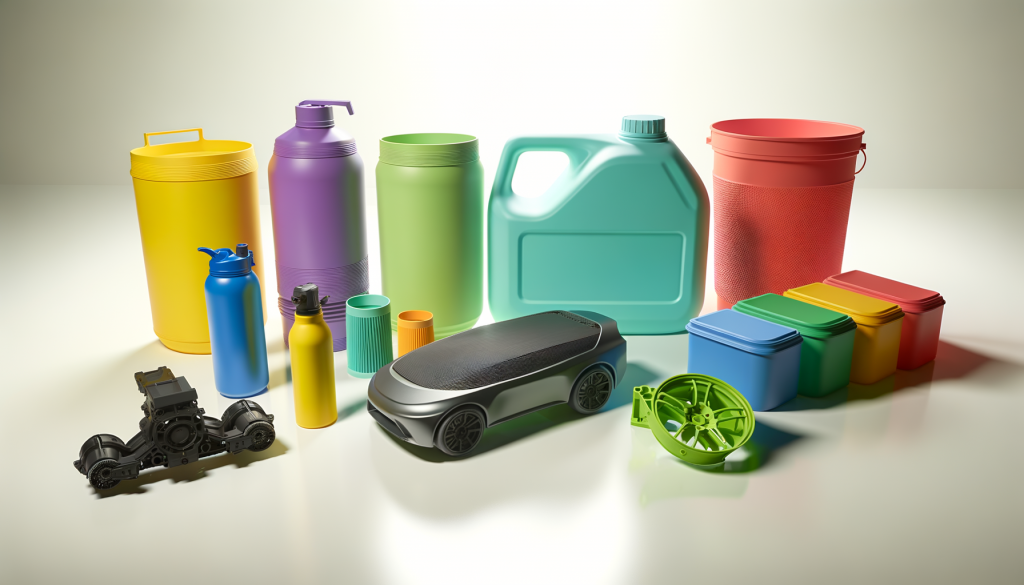
Mechanical recycling: efficiency and quality
Mechanical recycling is the most widespread process for recovering post-consumer plastics. It consists of collecting, sorting, shredding, washing, and extruding the material. This technology makes it possible to obtain recycled pellets suitable for manufacturing packaging, industrial components, and textiles. For example, at Reciclados La Red by Veolia, we use optical sorting systems and hot washing to guarantee the purity of recycled plastic, achieving a 70% reduction in CO₂ emissions compared to virgin plastic.
Chemical recycling: closing the loop
When plastic waste is difficult to recycle mechanically, chemical recycling offers an innovative alternative. Through processes like pyrolysis or depolymerization, plastics are turned into monomers or oils that can be reused in the petrochemical industry. This allows complex materials to be recycled and expands the range of applications for recycled plastic. The integration of both technologies is fundamental to achieving recycling rates above 50% in the coming years.
Circular economy and traceability
Traceability is essential to guarantee the quality and safety of recycled plastic. Thanks to digital systems and certifications, it is possible to track the material from its collection to its final transformation. This provides confidence to customers and facilitates compliance with increasingly demanding European regulations. In addition, the circular economy generates local jobs and encourages innovation throughout the value chain.
Education and awareness
Citizen awareness is the first step towards effective recycling. Educational campaigns, school workshops, and collaborations with municipalities are key tools to increase the selective collection rate. The greater the social participation, the greater the quantity and quality of recycled plastic available to industry.
Tangible results: success stories in plastic recycling
Case 1: Sustainable innovation in post-consumer black LDPE
At Reciclados La Red by Veolia we have implemented major improvements in the production process of post-consumer commercial black LDPE, committed to sustainable innovation. Thanks to a series of technical advances, we have significantly raised the quality and sustainability standards of our product. The main improvements include reducing the temperature during recycling, incorporating advanced filtration systems to achieve greater purity, and precise homogenization that guarantees uniformity and quality control in each batch. These innovations allow us to offer recycled LDPE that not only meets, but exceeds, market expectations in terms of performance, durability, and environmental commitment.
Case 2: Recycled PET for food packaging
TorrePET by Veolia processes 60,000 tons of plastic waste per year. Thanks to decontamination technology, high-quality food-grade recycled PET pellets are produced. Recycled PET makes it possible to reduce the carbon footprint of packaging without compromising safety.
How to implement plastic recycling in your company: roadmap
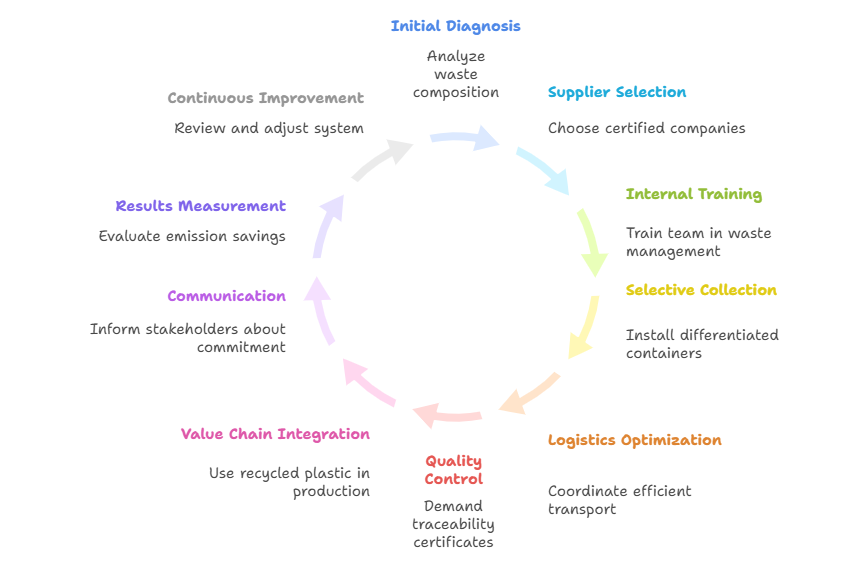
The time to act: together for a circular future
Plastic recycling is much more than a trend: it is an urgent necessity to protect the planet and ensure business competitiveness. Every recycled package, every kilo of recovered plastic, adds up to building a real circular economy. At Reciclados La Red by Veolia, we believe in the power of collaboration and innovation to turn waste into opportunities.
We invite you to join this movement. Whether you are a customer, supplier, or citizen, your role is key. Get informed, participate, and demand products made with recycled plastic. Together, we can show that plastic is not the enemy, but a valuable resource when managed responsibly.
Contact our team to start your circular transition.


